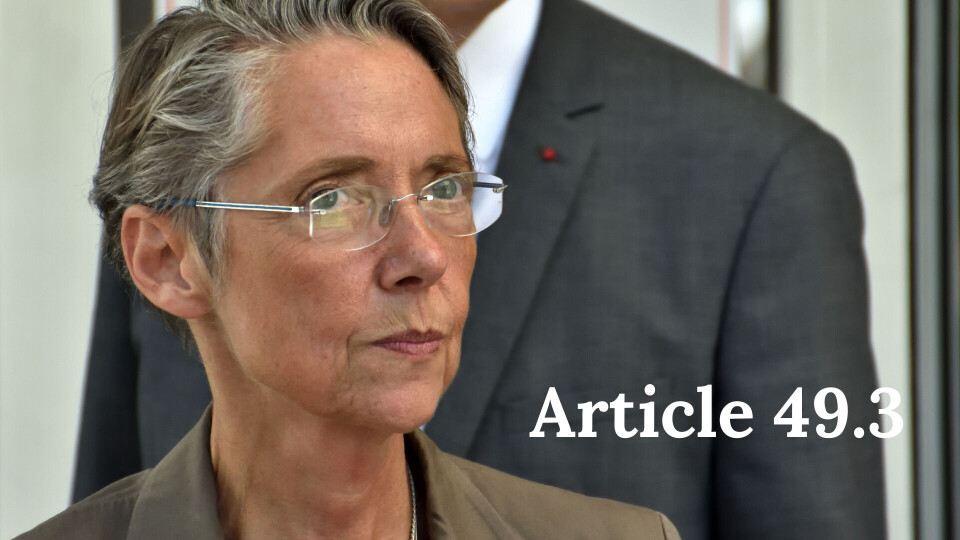-
Video: raccoon spotted in French Pyrenees
Local animal experts say this is ‘not good news’ and ask the public to report any further sightings
-
Man in custody over death of French jogger was previously imprisoned twice for rape
DNA of jogger, 28, was found in the man’s car
-
French weekend weather forecast September 13-14: Rain for most areas
Summery conditions will only be present in the south on Sunday
Article 49.3: French government prepares to push budget through today
The final text is expected to retain some of the 3,400 amendments put forward by opposition MPs but will drop several key proposals

France’s government is expected to trigger article 49.3 of the Constitution this afternoon or evening (October 19) in order to push its budget bill through Parliament and dodge the “blocks” created by opposition parties.
President Emmanuel Macron’s Ensemble ! alliance claimed 245 seats in June’s legislative elections, short of the 289 needed to ensure that bills can be passed through the lower house of parliament, the Assemblée nationale, without backing from opposition parties.
Article 49.3 would enable Prime Minister Élisabeth Borne to unilaterally pass any bill concerning financial or social security issues.
Read more: French cabinet approves right to use 49.3 rule to ease budget deadlock
Read more: Explainer: what is France’s article 49.3 and why is it in the news?
It has come into play now because of opposition from other parties on key points contained with the projet de loi de finances pour 2023 budget. Members of the opposition have proposed over 3,400 amendments to the bill.
Although budget debates are continuing in Parliament, government spokesperson Olivier Véran said on France 2 this week that article 49.3 would “probably” be used today.
President Emmanuel Macron is due to lunch with Ms Borne today and they are expected to discuss whether the article should be activated this afternoon, along with any additions or changes to be made to the text.
It is thought that 80-100 of the more than 3,400 amendments put forward by opposition parties will be retained in the final version of the bill, representing an extra €700-€800million in public spending compared with the original, according to government sources.
“We are not going to go through 70 hours of debate pretending to keep up a dialogue and then keep nothing,” one minister told France Télévisions.
Such amendments include a different tax status for the widows of army veterans, increased tax credits for childcare costs and reductions to taxes on small and medium sized businesses.
No amendments suggested by Rassemblement national or La France insoumise are expected to be kept.
A change proposed by Mouvement Démocrate – which forms part of the ruling Ensemble ! alliance – involving a tax on super-dividends issued by big companies, is also set to be dropped.
The risk of triggering article 49.3
Article 49.3 is often described as the ‘nuclear option’ due to the fact that it could result in the collapse of the government.
This can happen through a motion de censure (vote of no confidence) which must be signed by 58 MPs – ten percent of members – within 24 hours.
If there is no ‘vote of confidence’ around the bill that the government is trying to push through using article 49.3, then the text is directly adopted. If, on the other hand, the government fails to get an absolute majority – 289 votes – in any ‘vote of confidence’ then the prime minister and government must resign.
To cause the collapse of the government, every opposition party would have to back the vote which is unlikely because Rassemblement national MPs would be reluctant to support a motion introduced by the left-wing Nupes alliance and vice versa.
The amendments causing parliamentary deadlock
Finance Minister Bruno Le Maire has told BFMTV: “If we kept all the amendments, there would be an additional €8billion in spending.”
Therefore, the most costly amendments are the most likely to be dropped in the final bill.
Mr Le Maire has also said that MoDem’s super-dividends tax is “profoundly unfair” because it would penalise French companies and not foreign organisations.
MoDem’s Eure-et-Loir MP Philippe Vigier said that it is “not good at all” that the government is removing the amendment “especially when it talks to us about building together.”
Another Renaissance MP has said: “Personally, I find that this is not a good signal to send to partners in MoDem and even less to the French people.”
In general, amendments introduced by far-right and far-left parties are not being taken up either, with a government source commenting: “They have set a line which excludes the possibility of including changes brought by the extremes.”
Oise’s Rassemblement National MP Philippe Ballard said: “All the government talks about is compromise, but when it comes to it, no one else matters.
“Sometimes I wonder whether I would prefer to just go home. We work practically to death until 03:00 in the morning, we propose amendments and they’re chucked in the bin.”
Parti socialiste MP Christine Pirès-Beaune said: “If no amendments which have been voted through against the will of the government are retained in the final text, it will really add fuel to the fire.”
She had put forward an amendment involving €675million in tax credits for care home residents, and it had been voted in in the Assemblée nationale, but it will not be appearing in the final text.
A government source said: “It is not a daft idea but it would cost too much.”
One amendment proposed by the Parti socialiste – cutting VAT to 5.5% on surgical facemasks – is to be kept in the final bill.
Les Républicains will also see several of their changes retained, including an increase of the value of titres-restaurant to €13.
Related articles
Call for ‘energy sobriety’ in France shows gap between rich and poor
‘Is French President Macron right or left-wing? It depends’
France to hold national debate over legalising assisted suicide
























